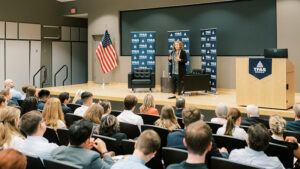

Earlier this month, The Fund for American Studies (TFAS) hosted the annual Dobriansky Lecture on Political Economy in memory of beloved professor Lev Dobriansky.
Dr. Rachel Ferguson, professor, assistant dean of the College of Business and director of the Free Enterprise Center at Concordia University Chicago, delivered keynote remarks.
Prior to her remarks, TFAS President Roger Ream ’76 shared the legacy of Lev Dobriansky, calling him the “moving force behind Captive Nations Week,” which honors and commemorates those who have died under communist rule.

As the founding director of the first TFAS program, the Institute on Comparative Political and Economic Systems, Dobriansky was an avid educator and activist who devoted his life to fostering a freer and safer world for all. Since 1996, TFAS students have attended this annual lecture to hear from a prominent scholar on the topic of political economy. Previous speakers have included: Dr. Steve Hanke, Nobel Laureate Dr. James Buchanan, Amity Shlaes, Dr. Arnold Kling, Dr. James Otteson and David Rivkin.
Dr. Ferguson follows in these academic leaders’ footsteps as she highlighted throughout her presentation the significance of advocating for those who need their voice heard. Ferguson opened her remarks by defining classical liberalism and the power of social capital. She emphasized that the primary role of government is to protect individual freedom, which consists of private property, contract rights and equal protection of laws. She argued that the problem faced by Black Americans is one of human dignity and freedom, not a political issue among the left and right.

As she outlines in her latest book “Black Liberation Through the Marketplace: Hope, Heartbreak, and the Promise of America,” Black Americans have faced and continue to face deep injustices, but government has often been the source of the problem, rather than the solution. Ferguson gave students a brief history lesson, providing numerous examples of how Black Americans have always been put at a disadvantage by government intervention.
In one historical example, she explained how those with minimum wage paying jobs were the ones who genuinely needed to work to make a better life for themselves but she argued that the true purpose of minimum wage was to create disemployment, not empowerment.

“If a wage is too far above what the market would normally offer, it will cause disemployment,” she said. “There will be people who cannot be paid at that rate.”
She ended the lecture by stating that even though many improvements have been achieved, there is still much more work to be done to create a nation that truly has liberty and justice for all.
“Great strides have been made but there is a lot of room to grow in terms of wealth accumulation and civil society that needs to be rebuilt,” she said.
Ferguson certainly captivated students’ interest during her talk. Following the lecture, students quickly lined up to continue the conversation with follow-up questions to learn more.
Watch the full lecture below and learn more from Ferguson on the Liberty + Leadership Podcast.

